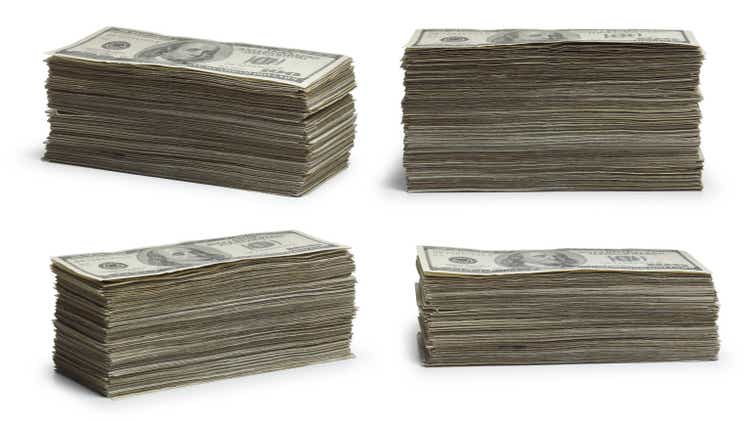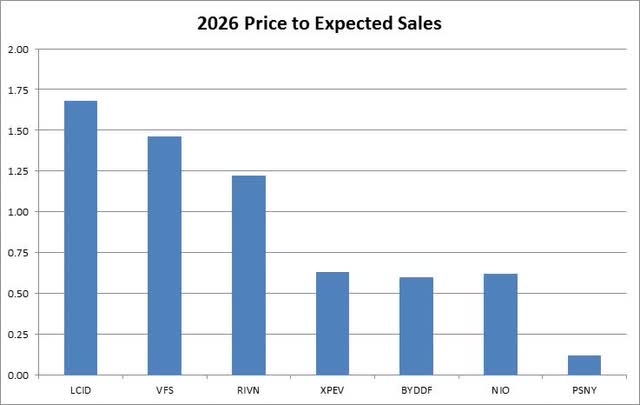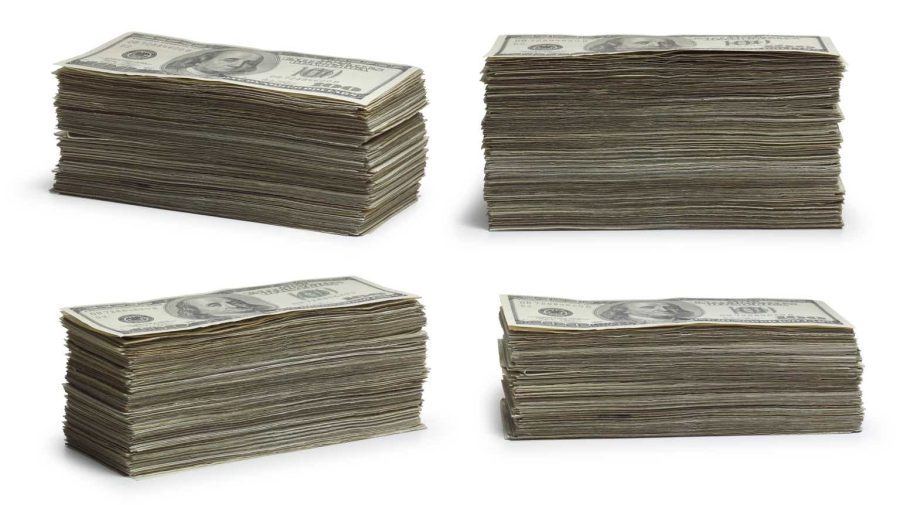Summary:
- Rivian shares surged after announcing a deal with Volkswagen, potentially bringing in necessary capital.
- Volkswagen could invest up to $5 billion here, but some of that would go towards a joint venture between the two firms.
- Rivian’s valuation is quite fair given expected 2026 revenues, but I can’t recommend buying until we see more progress on losses and cash burn.
DNY59/E+ via Getty Images
One of the most disappointing names in the market in recent years has been Rivian (NASDAQ:RIVN). The electric vehicle maker saw shares surge to nearly $180 after going public, only to find themselves in the single digits a few months ago. After the bell on Tuesday, the company announced an agreement with automotive giant Volkswagen (“VW”) (OTCPK:VLKAF) that could bring in some necessary capital and help Rivian fund its long-term growth plan.
Looking back at the previous surge:
Back in March, Rivian shares popped when the company announced its second generation vehicle. At that time, I cautioned investors with a Sell rating because the new models shown off were still a couple of years away, and reservation numbers weren’t as impressive compared to when Tesla (TSLA) launched the Model 3. At the time, Rivian was also changing its production plans to lean more on its current factory in Illinois while pushing back its Georgia facility a bit.
The main issue I had with Rivian at that time was its continued large losses and cash burn. This process continued at the Q1 report in early May, when Rivian lost over $1.44 billion and continues to lose money before even considering operating expenses. Considering that revenues had more than doubled over the prior year period, Rivian should have been able to improve its bottom line over Q1 2023 levels. The company has needed multiple capital raises since going public to stay afloat, and it still likely needed more funds to get through the next few years. As of Tuesday’s close, shares of Rivian were down about 6% since my previous article, compared to a nearly 7% gain for the S&P 500.
The Volkswagen deal:
After the bell, news broke that Volkswagen was investing $5 billion in Rivian, although the details aren’t as promising as headlines might suggest. As the deal filing states, Rivian will get $1 billion from VW in the form of a convertible note. The debt will have annual interest of 4.375% and half of it will convert for less than $11 per Rivian share. The other half will convert at a price to be determined on how shares of Rivian fare before conversion.
The second part of the announcement was that the two companies will form a joint venture. The partnership is intended to focus on software, electronic control units, and related network architecture design and development. Rivian can get $2 billion in additional capital from VW (a billion each in 2025 and 2026 if certain conditions are met) through the sale of Rivian shares. Another $2 billion can go to the joint venture, with part being paid at the venture’s formation and another part as a loan in 2026.
Rivian shares on Tuesday afternoon surged over 50% at one point, topping $18 for the first time since January. However, the rally faded quite a bit on Wednesday, just like how the R2 rally earlier this year didn’t last too long. Part of this surge can likely be attributed to a bit of a short squeeze. At the end of May, short interest at Rivian was over 133 million shares, which would equal 19% of the stock’s float.
Rivian finished Q1 with a little less than $9.4 billion in cash and investments on the balance sheet against more than $4.4 billion in debt. This was after the company burned over $1.5 billion in cash during the first quarter. A lot of this burn was coming from large losses, which Rivian hopes to reduce significantly over the next few quarters. The company shut down its plant in Q2 for retooling, and it hopes to produce positive gross profits by the end of this year.
Valuation is okay after pullback:
With Rivian shares up 23% on Wednesday, the company is worth roughly $14.5 billion currently. While the company is expected to show some decent revenue growth in the coming years, so are most electric vehicle names that are producing low unit volumes currently. Based on current analyst estimates, the rally puts Rivian at about 1.22 times expected 2026 revenues. This figure doesn’t include potential dilution from the Volkswagen debt or any of Rivian’s other convertible notes, which could push the share count and thus the valuation up quite a bit.
Right now, Tesla goes for over 4 times its expected sales for 2026, but the rest of the EV players all go for less than two times. As the chart below shows, Rivian now trades below the valuation of Lucid (LCID) and VinFast (VFS), two companies that it is in better shape than. Chinese players like Nio (NIO), BYD (OTCPK:BYDDF), and Xpeng (XPEV) go for way less at the moment, while Polestar (PSNY) is trading like it is about to go bankrupt. Traditional US automakers go for about 0.3 times their expected sales in 2026, meaning Rivian goes for about 4 times that.
2026 Price to Sales (Seeking Alpha)
The after-hours surge also reduced a little of the bullish analyst sentiment around for the time being. Going into Tuesday, the average price target on the street was $15.12, which implied decent upside, but that gap has certainly narrowed. The good news is that the pullback got us back under the average because for a time around $18 or so it looked like analysts were thus calling for meaningful downside. As a reminder, however, analysts less than three years ago saw Rivian worth almost $137, so the valuation cut here has been tremendous.
Final thoughts / recommendation:
Rivian shares jumped on Wednesday thanks to an announced deal with Volkswagen. While the deal may bring in some needed capital over the next couple of years, not all of it will go to the parent company, and it could be quite dilutive for shareholders in the end. This rally was likely a bit of a short squeeze, but the stock is fairly valued in the EV space after the rally fizzled quite a bit during the trading day.
I am upgrading Rivian shares to a hold on the Volkswagen deal. I initially was going to keep a sell with shares around $18, but the valuation argument doesn’t hold after a more than $3 pullback from Tuesday’s after-hours finish. Now that it looks like Rivian can avoid another capital raise this year, investors will turn their focus on the company’s cost structure improvement plan. The one thing that keeps me from going to a buy though at this point is that management still has to prove it can hit its margin targets and get that cash burn down. Should things start to trend that way in the next quarter or two, we can look at a potential upgrade then.
Analyst’s Disclosure: I/we have no stock, option or similar derivative position in any of the companies mentioned, and no plans to initiate any such positions within the next 72 hours. I wrote this article myself, and it expresses my own opinions. I am not receiving compensation for it (other than from Seeking Alpha). I have no business relationship with any company whose stock is mentioned in this article.
Investors are always reminded that before making any investment, you should do your own proper due diligence on any name directly or indirectly mentioned in this article. Investors should also consider seeking advice from a broker or financial adviser before making any investment decisions. Any material in this article should be considered general information, and not relied on as a formal investment recommendation.
Seeking Alpha’s Disclosure: Past performance is no guarantee of future results. No recommendation or advice is being given as to whether any investment is suitable for a particular investor. Any views or opinions expressed above may not reflect those of Seeking Alpha as a whole. Seeking Alpha is not a licensed securities dealer, broker or US investment adviser or investment bank. Our analysts are third party authors that include both professional investors and individual investors who may not be licensed or certified by any institute or regulatory body.
